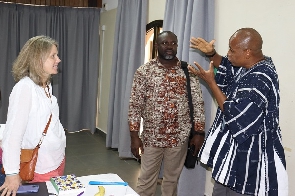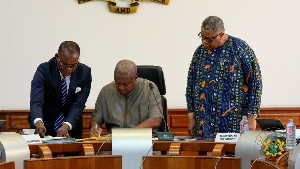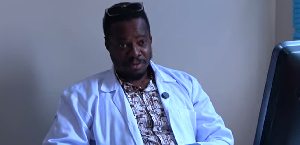Health financing has been identified as the key to unlocking progress toward the attainment of Universal Health Coverage (UHC) as enshrined in the 2030 agenda for sustainable development, especially the Sustainable Development Goal (SDG) 3.
On average, Ghana’s total health spending is lower than comparator Sub-Saharan African and lower-middle income countries. However, it has a relatively higher share of health spending derived from public sources as compared to out-of-pocket sources.
External assistance for health has decreased dramatically as a share of total health spending between 2015 and 2019, falling from 25% to 11%. This number is higher on average as compared to other lower-middle income and there is a concern about a lack of significant policy measures needed to facilitate a transition process whereby previously supported donor interventions are sustained with domestic, public financing.
To help address the funding gaps, boost investment and improve health outcomes, the Ministry of Health has developed a National Health Financing Strategy. This was made possible with funding from the United Nations Multi-Partner Trust Fund Office (UNMPTF) through the technical leadership of the World Health Organization (WHO).
“Ghana has taken very significant steps towards achieving the UHC and we recognized that financing our health ambitions cannot be realized without an effective strategy in place,” noted Mr. Kwakye Kontor, the Head of Planning & Budget Unit at the Ministry of Health and the lead Coordinator of the review of the Health Financing Strategy.
But the partnership between Ghana and WHO towards this new financing blueprint for Ghana has been long in the making. The development of the strategy was one of the key recommendations of the 2019 Ghana Health Financing Forum.
“The strategy development process has been two years of co-creation by partners,” says Susan Sparkes, a WHO Technical Officer with the health financing team at the WHO headquarters. “The process demonstrates how nimble WHO is in responding to the needs governments.”
For the purposes of developing a comprehensive strategy that can be owned by all stakeholders, the Technical Working Group on Health Financing has been activated, comprising members from key stakeholder institutions to co-create the strategy to meet the current and future financing needs of the health sector.
“The processes for the development of the strategy are as important as the final document itself. The outcome of the participation of key stakeholders in this long process has demonstrated what we can achieve if we deepen collaboration towards health financing” Kingsley ADDAI FRIMPONG, Health Economist – at the Universal Health Coverage and Life Course Cluster, WHO Ghana.
As rightly noted by the Director for Research, Policy, Monitoring and Evaluation at the National Health Insurance Authority (NHIA), Dr. Francis Asenso-Boadi, the strategy development process has benefited from the expertise of various stakeholders who are active players in Ghana’s health financing regime. “The great thing about this strategy is that, it incorporates the expert inputs of all key stakeholders,” noted Mr. Asenso-Boadi. “We are confident that, this strategy will transform health financing at all levels of care”.
Over the last 30 years, Ghana has shown its strong political, legislative, and fiscal commitment to health system reform to make progress towards UHC. This includes the UHC Roadmap and the Health Sector Medium-Term Development Plan (HSMTDP) 2022-2025.
Therefore, the health financing strategy is expected to complement existing efforts towards UHC attainment in Ghana.
“Given the financing needs of the health sector, this strategy is coming at a better time,” the Head of the United Nations (UN) Systems Unit, Ministry of Finance, Mrs Gladys Osabutey, indicated. “With the inclusion of all key stakeholders in the strategy development process, I am convinced we will have the needed discipline for effective implementation.”
The significance of the strategy and its inclusive development process is not lost on Ghana’s health sector development partners. As Dr Elisha Kipkemoi Ngetich, a Health Specialist at the World Bank believes “the diversity of voices that is reflected in the strategy development process is an indication of the commitment of all stakeholders to seeing a well-financed health sector that makes healthcare accessible and affordable to the population”.
The 2022 Ghana Health Financing Strategy (HFS) builds on the foundation of health vision, policy, strategy, and priorities contained in the UHC Roadmap and Health Sector Medium-Term Development Plan 2022-2025.
The HFS digs deep to identify, explore, and propose solutions to key, intractable, and longstanding health financing issues. It also develops specific strategies for the health financing functions of revenue collection, pooling and purchasing.
This two-pronged approach of addressing key, longstanding issues and further strengthening the three health financing functions creates dynamic, sequenced interaction and synergies between targeted activities and comprehensive strengthening, avoids duplicating the UHC Roadmap and ensures sufficient depth of strategies and plans to make progress in addressing the continued health financing and service delivery challenges in Ghana.
Health News of Wednesday, 18 January 2023
Source: who.int













